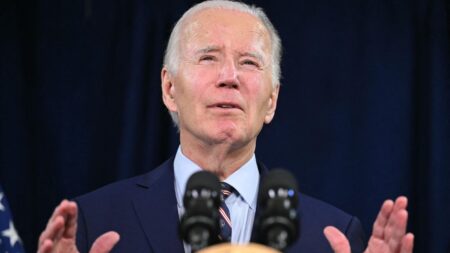The Federal Bureau of Prisons (BOP) experienced a dynamic year marked by progress, challenges, and resolution of lingering issues. Under the leadership of Director Collette Peters, the BOP appears poised to become a leaner more efficient organization, focused on tackling persistent problems like understaffing and infrastructure modernization.
With an annual budget of $8.3 billion – the largest allocation within the Department of Justice – the BOP faces mounting scrutiny over its expenditures. Despite housing over 50,000 fewer prisoners than its 2023 peak of 213,000, the budget has continued to grow. This increase reflects the rising costs of overtime to offset staffing shortages, prisoner healthcare, daily living expenses, and repairs to aging facilities.
Looking ahead, the BOP will need to navigate a shifting landscape, particularly under a new administration intent on cutting costs. Balancing fiscal responsibility with the need for safe and humane conditions will present a significant challenge in the coming years. The agency’s ability to adapt and innovate will be critical as it works to address longstanding operational inefficiencies while meeting evolving public expectations.
Director Peters inherited a troubled agency that has faced persistent scrutiny from the Office of Inspector General (OIG), Congress and Government Accountability Office, which placed the BOP on its high-risk list for management challenges. In 2024, the BOP ranked last in employee satisfaction among federal agencies, highlighting ongoing morale and workforce issues. Despite offering aggressive retention and sign-on bonuses, the agency has struggled to attract new employees, underscoring the need for additional reforms as 2024 drew to a close.
As the fifth director since 2016, Peters has received support from Congress, even as the agency continues to face significant hurdles. In a pivotal moment this year, she welcomed the passage of the Bureau of Prisons Oversight law, which introduced measures such as unannounced inspections of institutions and the establishment of an ombudsman to address prisoner issues. These changes signal a move toward increased transparency and accountability within the agency.
One of the BOP’s standout achievements in 2024 was its management of Cares Act prisoners, who were transferred to home confinement during the pandemic. This program allowed many older and medically vulnerable prisoners to serve their sentences at home, under strict rules, rather than in prison. Its success was evident, as nearly all participants completed their terms without incident. Building on this, President Biden granted clemency to the remaining 1,500 CARES Act prisoners, a decision that further underscored the program’s effectiveness.
This success could serve as a model for the future, particularly as the BOP explores ways to align with the goals of the First Step Act. By allowing minimum-security prisoners to serve a greater portion of their sentence in the community, the agency may be able to reduce costs, improve rehabilitation outcomes, and address some of the systemic issues that have plagued it for years.
Under Director Peters, the First Step Act saw significant advancements, including the implementation of a forward looking sentence calculator. The tool provided much needed guidance on release dates, allowing for more effective planning of prisoner transitions into programs such as halfway houses and offering greater accuracy in predicting the completion of terms of confinement. While some issues remain, the improved system has ensured that individuals are receiving the full credits earned through program participation, a long awaited achievement.
Peters also took bold action by closing six male minimum-security prisons and permanently shutting down FCI Dublin, a women’s facility previously evacuated due to multiple instances of sexual assault by staff members, including the warden. The BOP settled a $116 million lawsuit brought by the women assaulted at the prison, marking a significant moment of accountability. The closure of the six male facilities—including major stand-alone camps in Pensacola, FL; Morgantown, WV; and Duluth, MN—will require the reassignment of over 500 BOP employees and nearly 2,000 prisoners. However, it also led to the elimination of three large Residential Drug Abuse Program (RDAP) facilities, which will increase pressure on the already limited RDAP capacity nationwide. This coincides with a declining minimum-security camp population due to the full implementation of the First Step Act, a landmark law enacted during the Trump administration.
Despite progress in sentence credit calculations under the First Step Act, challenges remain in transitioning eligible prisoners to prerelease community confinement, primarily due to limited halfway house capacity. While efforts to expand this capacity have been slow, the recent release of 1,500 prisoners on CARES Act home confinement may help alleviate some of the strain.
Caring for prisoners at BOP medical centers continues to experience issues. A recent OIG report detailed an inspection of FMC Devens where it found significant staffing shortages where 20% of positions in Correctional Services were vacant, as well as 24% in Health Services and 39% in Psychology Services. The conclusion of the report was “Significant and widespread staffing shortages in the Health Services Department compromise FMC Devens’s ability to provide adequate healthcare to inmates.” In another care involving healthcare, a former BOP lieutenant was recently found guilty of violating the civil rights of an inmate by showing deliberate indifference to the inmate’s serious medical needs.
The Trump administration has pledged an overhaul of the Department of Justice, signaling plans to expand the use of the death penalty and Presidential Pardons. Former Florida Attorney General Pam Bondi, Trump’s nominee for Attorney General, is expected to assume the role in 2025, bringing a new direction to federal enforcement and corrections policy.
For the Federal Bureau of Prisons (BOP) and the approximately 150,000 prisoners under its care, 2025 promises to be another year of significant change. During his first term, Trump expressed strong support for private prisons, leading to a surge in publicly traded stocks of private prison companies following the November election. Many speculate that these companies could play a key role in expanding halfway house capacity, enabling more prisoners to transition into community confinement for longer portions of their sentencing.
Read the full article here
















